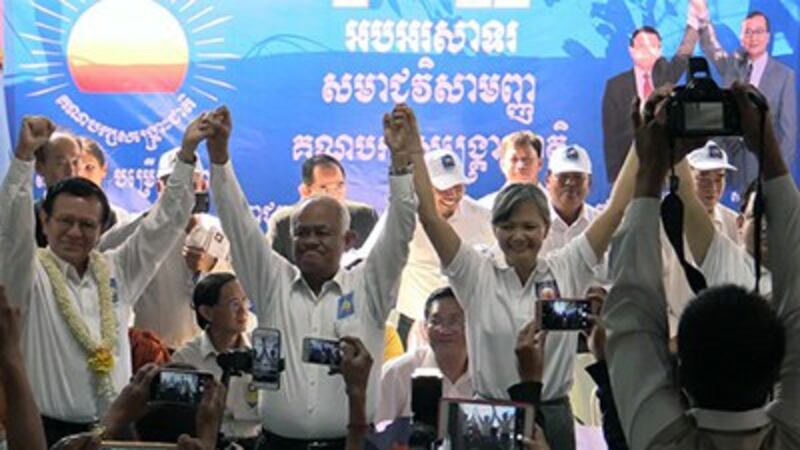UPDATED at 10:30 A.M. EST on 2017-05-22
The head of Cambodia’s opposition Cambodia National Rescue Party (CNRP) on Wednesday called on his party’s candidates to remain above the fray amid a slew of threats from Prime Minister Hun Sen’s ruling Cambodian People’s Party (CPP) in the lead up to local elections set for next month.
Speaking in the capital Phnom Penh ahead of a 14-day campaign period beginning on May 20, CNRP president Kem Sokha told a gathering of 103 “top ranked” female candidates that the party must adhere to nonviolence and avoid trading insults with the CPP ahead of the country’s June 4 commune elections.
“We are not cowards, brothers and sisters, but we are well aware that we are marching towards our goal,” he said.
“Let me give you the example of a race: If we want to overtake our challengers and they turn to block us with their legs, should we bother ourselves with attacking them back? Do not engage, just continue on, brothers and sisters!”
Kem Sokha made specific reference to a warning by defense minister Tea Banh on Sunday that the army will “smash the teeth” of anyone protesting an election win by the ruling party and quickly suppress any demonstrations by CNRP members like those that followed the opposition’s loss in national elections in 2013.
“Let the people make a judgment in regard to those who want to ‘smash our teeth’ or whatever they plan,” he said.
“We really do want their votes, but the people can make their own decisions. If they prefer those who want to ‘smash our teeth,’ they should vote for them. But if they prefer gentle people, such as those in the CNRP, please vote for the CNRP.”
Kem Sokha suggested that the people of Cambodia will “eventually elect peace lovers” to lead the country, adding that the CNRP will “opt for a nonviolent approach in both words and deeds” during the upcoming campaign.
Tea Banh’s remarks came less than a week after Cambodia’s prime minister Hun Sen warned of civil war if the public does not support his CPP in local elections on June 4.
Hun Sen, who has already ruled Cambodia for three decades, has made similar threats in recent months, with CPP-controlled media regularly alluding to violence if the party loses.
In response to Kem Sokha’s speech, CPP lawmaker and spokesperson Sok Ey San said Wednesday that the people of Cambodia are already well aware of which party can maintain peace in the country and which one will be “stirring up trouble” after next month’s polls.
“The people don’t need … a party that only knows how to speak lies and cheat them from one issue to another,” he said.
“The people need a constructive party that protects peace for the sake of bringing progress and prosperity to their livelihoods.”

Deputies elected
Also on Wednesday, the CNRP held an extraordinary congress to elect Mu Sochua, Pol Hom and Eng Chhai Eang as the party’s vice presidents after amending a crucial bylaw in a bid to placate the Ministry of Interior, which rejected its previous method of selecting the same leaders in March.
At the conclusion of the extraordinary congress, CNRP spokesperson Yim Sovann announced in a press briefing that the three lawmakers had been named vice presidents and said the party will forward official documentation detailing its hierarchy and leadership profiles to the ministry.
Last month, the CNRP amended Article 47 of its internal regulations a second time, after an initial change at another congress in March, to state that if there is no vice president, the steering committee must choose new ones from its members by an absolute majority of votes, which it did Wednesday.
The clash between the CNRP and ministry over the opposition’s leadership selection process began in March after former party president Sam Rainsy resigned.
On March 31, the CNRP notified the Ministry of Interior of amendments to its party bylaws after the ministry had declared the opposition’s appointment of Kem Sokha as president and the three lawmakers as vice presidents illegitimate, throwing its participation in the upcoming elections into question.
The ministry had claimed that the appointments during a March 2 extraordinary congress ran afoul of the CNRP’s statute, based on documentation the party filed in 2013, requiring a moratorium on electing a new president for 18 months after the post was vacated.
The CNRP had amended the statute at the congress before appointing new leadership.
On Wednesday, Ministry of Interior spokesperson Khieu Sopheak said the ministry had yet to receive an official letter from the CNRP concerning the election of the opposition’s vice presidents and declined to say whether the new appointments were done in accordance with the party’s bylaws.
“I don’t dare comment on anything yet,” he said. “We will have to wait for the letter before we can make a determination.”
Observers say the CNRP—one of 12 political parties competing for 1,646 commune council seats—could give the CPP a run for its money in the June polls, foreshadowing a possible CNRP win in national elections scheduled for 2018.
Reported by Neang Ieng and Vandeth Van for RFA’s Khmer Service. Translated by Sovannarith Keo. Written in English by Joshua Lipes.
Correction: A previous version of the article erroneously stated that political parties are permitted to campaign for 12 days ahead of the June 4 ballot.
